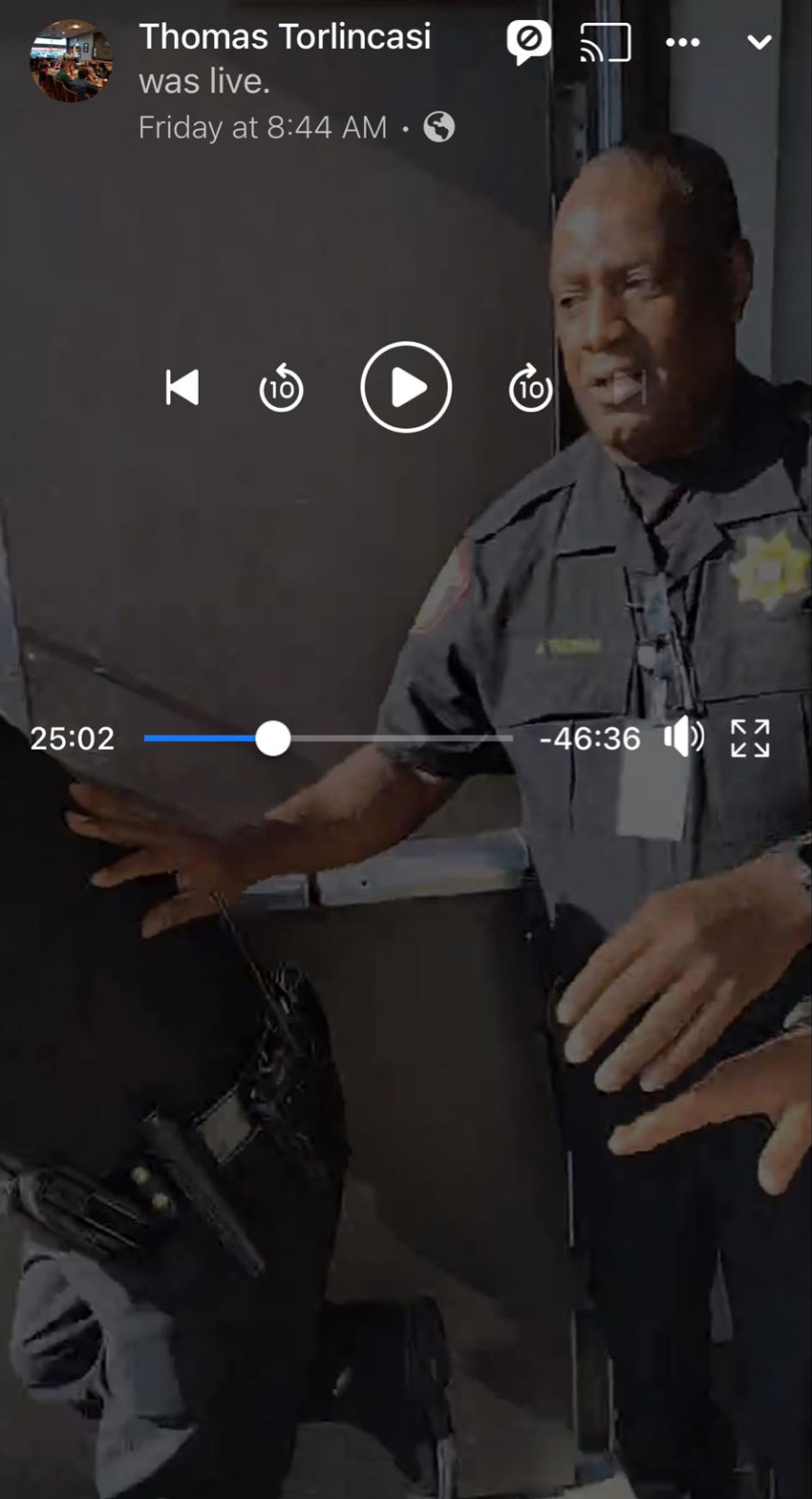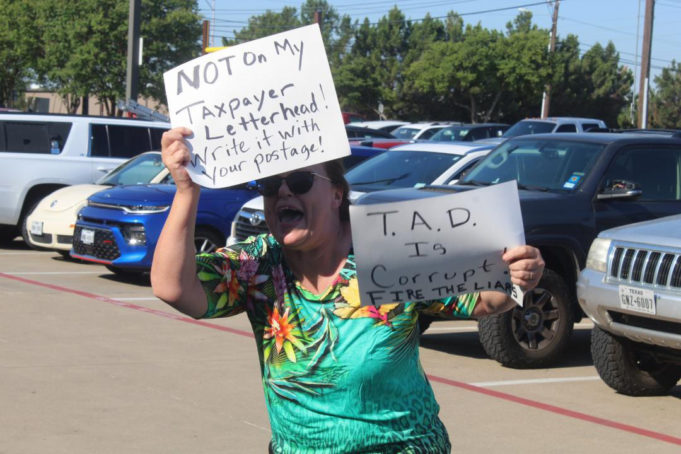The recent decision by Tarrant Appraisal District’s board to suspend its chief appraiser for two weeks without pay is the closest he has come to being outright fired in his 14 years in office. One board member motioned to terminate Jeff Law, but the action was never seconded.
The weeks leading to the unprecedented reprimand were characterized by public uproar over the mistreatment of a local Realtor. Last fall, TAD director Randy Armstrong filed several complaints against Chandler Crouch, complaints that were later ruled baseless by the Texas Department of Licensing and Regulation (TDLR). Armstrong’s allegations were largely seen as retaliation against Crouch’s volunteerism. The Realtor helped tens of thousands of locals protest their property valuations for no charge — an act that apparently irked Armstrong and possibly Law himself.
Through public testimony and released documents from open records requests, it was revealed that Law knew about Armstrong’s complaints last fall but failed to notify the board, even though Armstrong wrote his complaints on TAD letterhead and mailed them using government resources.
TAD recently hired a PR firm to handle the media and improve the district’s battered public image. TAD’s critics maintain that the revamped communications effort does not make up for years of alleged misdeeds.
Swatting Away Problems?
On Monday, June 10, a 911 dispatcher directed a Haltom City police officer to a suspected robbery in progress.
“Resident heard glass break downstairs, looked over the banister, and observed a white male with a black mask and black hoodie,” the dispatcher said.
The police report read, “Upon arrival, the officer found no broken windows or any form of forced entry.”
The responding officer detained the homeowner, Deputy Sheriff J.D. Thomas, who has worked security at TAD for more than two years during his 17 years for the county, and described the call as “a possible hoax.”
Who called the police and why remain unclear, but several sources allege Thomas himself dialed 911 to frame two individuals — Manuel Mata and Thomas Torlincasi — who criticize TAD through YouTube videos and livestreams. To force YouTube to pull an unflattering video, Thomas, Torlincasi believes, pulled a prank. It’s called “swatting,” and it’s when you call the police on someone, even yourself, to force law enforcement to question a target of yours, and for Thomas, in Torlincasi’s opinion, that target was him (Torlincasi) and his fellow watchdog, Mata.
Thomas initiated the swatting “to get Manuel Mata’s video off YouTube,” Torlincasi said.
The unflattering video, one Mata recorded several hours before the alleged swatting incident, showed Thomas having parked his black sedan in the fire lane outside the TAD building. Torlincasi’s theory is this: Thomas was miffed by the video that mocked him and his car, and that showed his license plate, so he created a situation — by allegedly calling the cops to his home — that made it appear that one of Mata’s viewers had made the bogus call after connecting Thomas’ license plate to Thomas’ home address.
If that was Thomas’ plan, it worked. By the next morning, the video was pulled. YouTube allows users to flag content if it poses a risk to someone’s safety. Having a police report as evidence allowed Thomas to have the video pulled quickly while portraying Mata as a threat to public safety, Torlincasi alleges.
The county says it’s investigating Thomas for possibly calling 911 to report a false crime. The spokesperson did not provide further comment, and Thomas did not return multiple calls and text messages to his cellphone seeking a response.
Based on the police report, Thomas did not follow up with a victim statement and did not respond to repeated follow-up calls from the Haltom City detective assigned to the case.
An open records request reveals that Daniel “Joe” Bennett, a local government watchdog, recently texted Tarrant County District Attorney Sharen Wilson about the incident.
“I am providing to you an incident report by Haltom City PD detailing a SWATTING incident of JD Thomas, sheriff deputy, who acts as security at TAD,” the message reads. “The importance of the [police] report is that this allowed JD to have the video taken by Manuel Mata at the June 10th TAD [board] meeting removed from YouTube because he claimed his personal license plates were in the video, thus leading to the swatting.”
Bennett told me he expects the DA to ignore the alleged swatting incident just as the office dismissed a January 2018 criminal complaint he filed against Law. The allegation dates back to 2017, when Bennett requested copies of documents tied to the late-2015 election that brought Johnny Bennett (no relation), John Molyneaux, Michael O’Donnell, Joe Potthoff, and Mark Wood onto TAD’s board.
Bennett began following TAD in 2016, when he was denied a hearing from the Tarrant Appraisal Review Board, the 70-member appointed group that hears property owner protests and approves or denies them during meetings at TAD’s headquarters in northeast Fort Worth.
He researched the voting cycle to understand it better, which turned into a hunt for voting irregularities. And he believes he found a substantial one.
Bennett alleges that TAD’s own official records show that two past board members should not have been elected. His evidence is a late-December 2015 letter that Law sent to County Administrator G.K. Maenius that includes a tally of votes from the taxing entities that elect TAD board members every two years. Law was required to send the letter because state law says the chief appraiser of any appraisal district must notify certain elected officials of the final board vote tally following an election.
In 2017, Bennett raised the issue of two possibly illegally elected board members at a commissioners court meeting, then alerted the DA’s civil division. Bennett believes Law tried to correct the error by allegedly altering the letter. Bennett forwarded the original and allegedly altered versions of the letter to TAD and the county. He obtained both through separate open records requests.
In his criminal complaint, which was accepted by the DA, Bennett alleges that Law violated state property code by failing to notify any taxing entities of the changes to the official results of a board election.
“The only logical conclusion is that this letter is fraudulent and sent with sole intent to appease and mislead,” Bennett writes, referring to the allegedly tampered December 2015 letter Law sent to Maenius.

Courtesy Thomas Torlincasi
In an act widely seen as retaliation against Torlincasi and Mata for their efforts to hold Thomas accountable and to improve transparency at TAD, several sheriff’s deputies, including Thomas, cornered Torlincasi and Mata during an August TAD board meeting. While pushing the two watchdogs out of TAD’s headquarters ahead of the meeting in which the chief appraiser was suspended, law enforcement allege that Mata assaulted one of the deputies. Mata was charged with assaulting a public servant, interfering with public duties, criminal trespass, and resisting arrest. He remains in Tarrant County Jail awaiting a hearing. Torlincasi was banned from entering TAD’s headquarters, a likely unenforceable action given that the northeast Fort Worth office is a public building.
If Thomas unlawfully arrested Mata that day, it wouldn’t be the deputy’s first time unlawfully arresting someone. A recent open records release of Thomas’ disciplinary history shows that he was suspended without pay for one day in 2015 for “causing a false arrest.”
Lakeside View of TAD
Lakeside Mayor Patrick Jacob said his first interactions with TAD date to the early 2000s, when he protested his personal property valuations. Even now, he recalls the looks of confusion on the faces of senior citizens who came asking basic questions about their property valuations.
“I’ve watched senior citizens walk out more confused than when they walked in,” he recalled. “I have raised my concerns before the board. The front desk needed more training.”
Jacob’s background in corporate leadership and more recent work as an elected official informed his views on TAD’s governance, and what he has seen in recent years has alarmed him, he said. In early 2020, after the election of two new board members, Rich DeOtte and Gary Losada, Jacob attended many board meetings and alleges that Law and the more senior board members were dismissive of DeOtte and Losada, who were widely seen as the lone reform-minded board members at the time.
Jacob was alarmed to learn that TAD’s five-member board did not have independent legal counsel, something that has been rectified only recently. Under common practice, governmental boards frequently retain independent legal counsel as a means of protecting themselves from potentially conflicting and self-serving aims of paid staffers.
The Weekly has reported extensively on TAD’s longtime current attorney, Catherine Alder, who earns $32,370 per month for legal services at the appraisal district. Her annual salary of nearly $400,000 dwarfs that of Fort Worth’s former city attorney, who earned $271,000 per year before she recently retired. Last year, a TAD spokesperson confirmed that Alder has no annual retainer agreement and that TAD’s board has not approved her salary other than through general budget approval. TAD’s critics frequently allege that one of Alder’s jobs is protecting Law.
In mid-2020, two TAD-related incidents further alarmed Jacob. On Aug. 30, State Sen. Jane Nelson, whose District 12 includes much of Tarrant County, wrote a letter to TAD’s leadership and board which voiced concerns over the high number of property valuation protests. Former TAD board member Losada alleges that Law and former TAD board member Michael O’Donnell attempted to hide Nelson’s letter from the board.
Losada shared copies of handwritten notes he took on June 4, 2020, six months after assuming office. He said he was on a conference call with Law and O’Donnell when Law and O’Donnell, assuming Losada had left the call, began discussing Nelson’s letter and what steps could be taken to hide it. Losada told the board about the letter, and Law released it.
That August, TAD board members O’Donnell and Molyneaux requested to be recalled, a step that required the taxing entities that voted for the two board members to recall those votes. Jacob believes O’Donnell sought to escape blowback for the handling of Nelson’s letter. The reason Molyneaux requested to be recalled remains unclear, although the two board members were seen as politically aligned.
Under state tax code, there is no provision for an appraisal district board member to call to be recalled, even though both board members were recalled later that year.
“The governing body of a taxing unit may call for the recall of a member of the board of directors of an appraisal district,” the tax code reads, meaning the recall of O’Donnell and Molyneaux did not follow state law.
O’Donnell and Molyneaux were replaced by Tony Pompa and Joe Ralph Martinez, who both remain on TAD’s board. Board member Jungus Jordan replaced Losada in January.
Around the time Jacob was following the alleged coverup of Nelson’s letter, a third-hand party provided the Lakeside mayor with written testimony from a female TAD employee who alleged she was being sexually harassed by senior male staffers with the appraisal district. Jacob did not provide the names of the parties involved but described the letter.
“It was other male employees harassing female employees to the point that the appraisal district made arrangements” to have her transferred to a business outside of TAD, Jacob said. “I talked to Jeff Law and [TAD Administrator] Jeff Craig about the accusations. Jeff Law told me to give him the files [describing the harassment]. I said, ‘You don’t seem to understand. The files need to go to an independent investigator, not you. You’re being accused of being part of the problem.’ ”
Law’s alleged attempt to learn the identity of the female employee alarmed Jacob.
“I have an extensive corporate background,” Jacob said. “It immediately put me on alert. I’ve seen too many people shove these things under the rug and not do anything for the employees.”
The targeting of Crouch by TAD leadership prompted Jacob and several elected officials to co-author their own complaint with TDLR, this one alleging an occupation code violation by Armstrong and Law.
“It is a violation for the TAD [board] to instruct Chief Appraiser Jeff Law to investigate” Armstrong because that creates a conflict of interest, part of the new complaint reads, referring to Law’s longstanding personal and professional relationship with Armstrong. “TAD’s board should conduct an independent investigation.”
Jacob offers advice for TAD’s current and future leaders.
“Transparency in government always works better,” he said. “It’s more work, but it’s more painful when you mess things up and hide it.”
Numbers Game
Unlike school boards, city councils, and other boards that oversee large governmental groups, TAD’s board is not elected by Tarrant County citizens but rather by officials representing taxing entities that are partly funded by property tax revenue. Cities, school districts, Tarrant County College, and the commissioners court, among others, are proportionately allotted votes from a pot of 5,000 points based on the size of those groups. It’s a system that disproportionately favors large governmental entities — Arlington school district (465), Fort Worth school district (610), commissioners court (515), and TCC (290) — that can theoretically collude to cherrypick TAD board members.
In the 2021 TAD election that brought on Jordan and booted Losada, it appears that a handful of powerbrokers effectively chose winners with little influence from smaller taxing entities. HEB school district trustee Fred Campos said he began tracking the numbers game a few years ago to measure how much influence larger groups have in the elections.
“I bet the commissioners court has been following these numbers for a decade or longer,” Campos said. The current voting system “probably made more sense 40 years ago, when entities mailed their votes and TAD would open the envelopes in December. There were no recordings of what HEB and Mansfield did. There wasn’t the internet and smartphones. It was only a matter of time before someone realized they can track this online.”
Larger groups like the Fort Worth city council and the commissioners court that have long-serving elected officials have another advantage over smaller school boards and councils that have high turnover, Campos added.
“You have publicly elected officials who roll on and off these smaller boards who don’t even know it is their civic duty to vote for TAD board members,” Campos said.

Five years ago during a commissioners court meeting, County Administrator Maenius said that the commissioners’ votes should be delayed so the five commissioners could swing the final tally toward candidates of the court’s choosing. A new state bill authored by State Rep. Matt Krause now requires any group allotted 5% of the overall vote every two years to vote early for TAD’s board elections, meaning any reasonably large entity like the City of Fort Worth or the Fort Worth school district. The new law theoretically evens the playing field by forcing those large groups to commit to a candidate before they can fully assess voting trends.
Although he believes the contact was made without malicious intent, Campos said that last year he received a personal call from County Judge Glen Whitley, who heads the commissioners court, that may have been intended to sway HEB votes toward TAD board chair Kathryn Wileman.
Campos believes that large voting blocs will always do their best to leverage their votes to maximum effect. That’s just politics. Although it may pose logistical hurdles, Campos said there should be a Tarrant County system in which votes are cast in secret and tallied only in mid-December.
This story is part of City in Crisis, an ongoing series of reports on unethical behavior and worse by local public leaders, featuring original reporting.
This article has been updated to correctly attribute a quote to Patrick Jacob.













This organization is so “bunkered IN” and the two men in the spotlight, Jeff Law and Randy Armstrong use an array of underlings to bully, gaslight, and deceive the public. Employees like Ricardo Aguilera, along with “contract employee” Deputy JD Thomas , literally use confusion, and PHYSICAL BULLYING as well as weaponized Law enforcement to keep the truth from getting to the public. There’s a LOT GOING on here, and none of it is good for property owners, members of the press, and pretty much everybody that’s not part of this corrupt government. Manuel Mata and I have heard “THEY don’t want you here”, “THEY Don’t want you here”, “THEY Don’t want you here”. THEY, THEY, THEY is sounding a lot like: KKK
It really is time for people to organize as citizens and get focused as a community to enforce accountability and transparency on our government and public officials.
Tarrant County has a way too much hegemony and cronyism going on in our local government. We have nepotistic dynasties and duplicitous double standards going on in our criminal justice system.
The bylaws of undue familiarity and collegial affinities supersede the constitutional and statutory authority of the law. We have a major issue with tyrannically dishonest super predator police and prosecutors going over the rails and off the map to get convictions contrary to the law and the evidence. And then in cases where a police officer or prosecutor is criminally implicated we have DA Sharen Wilson totally ignoring her oath bound duty and obligations under Articles 2.03 to enforced the law and promote equal justice under the law.
It’s time for people to stop being apathetic and start demand that the government respect that it exists to serve the will of the people.